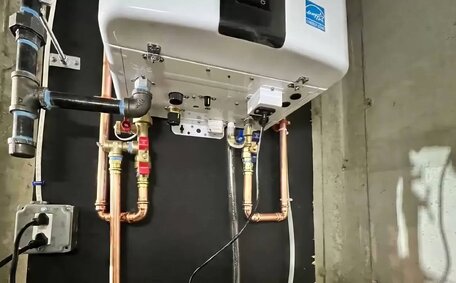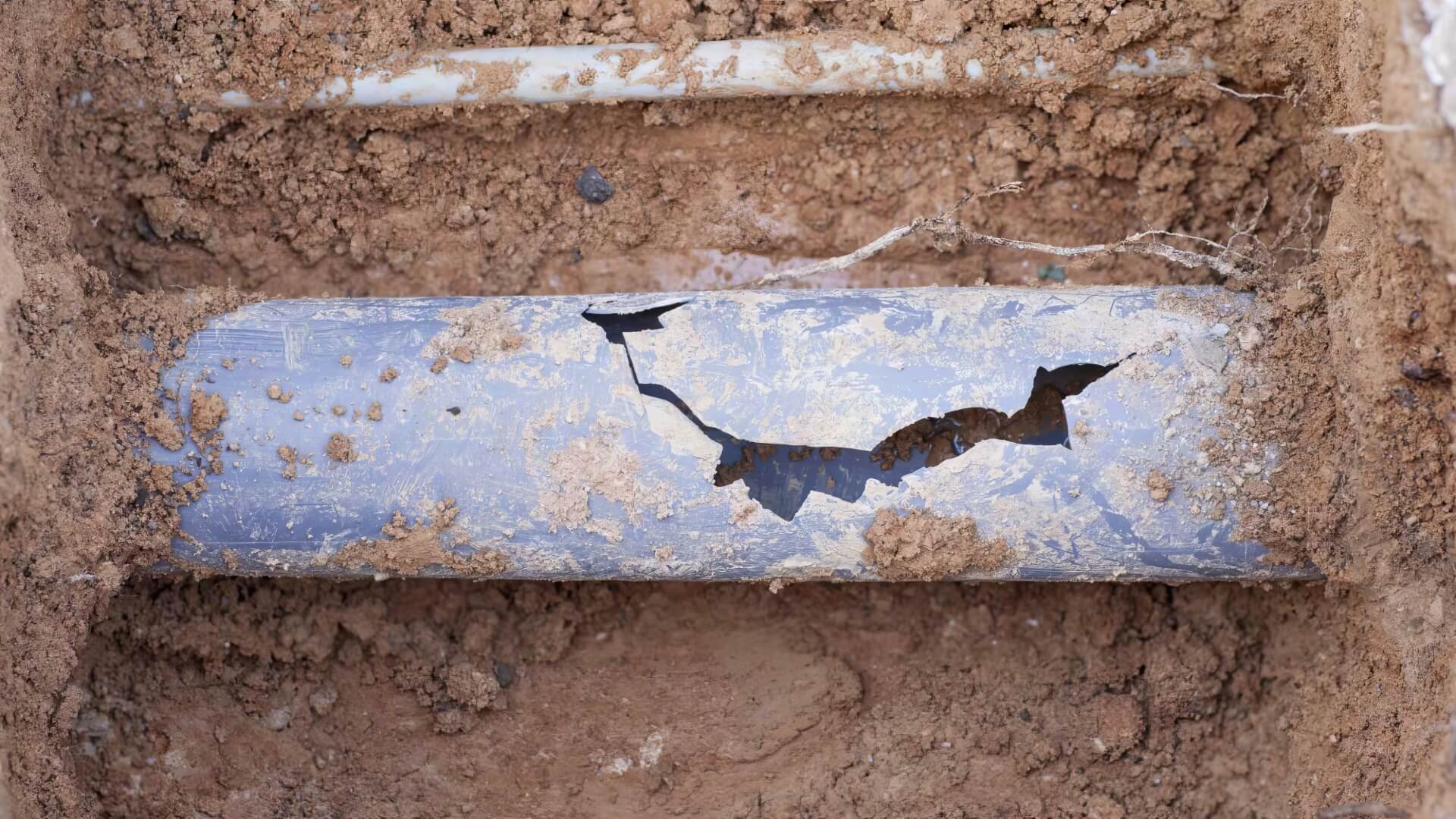Identifying a Blocked External Drain
Signs that your outside drain may be blocked include water pooling, slow drainage, gurgling noises, and unpleasant odours.
Visible debris such as leaves, branches, or litter around the drain grate is a clear indication of a blockage. You may also notice water overflowing from the drain during heavy rain.
Inspecting the drain closely with a flashlight can help identify signs of blockage. If you can see the blockage, this makes clearing methods easier to target. Even with blockages deeper in the pipe, effective unblocking methods are available.
Act promptly to prevent flooding, yard overflow, system damage, and high plumbing costs. If DIY methods fail, seek professional help immediately.
Common Causes of Blocked External Drains
Common culprits for drain blockages that disrupt water flow include:
- Leaves and debris - Plants and trees shed leaves, twigs, and other matter that can collect over drain grates.
- Cooking fats and oil - Greasy residue from food preparation often washes down outdoor drains, then cools and congeals into blockages.
- Dirt and mud - During heavy rain, drains can become obstructed by a gradual buildup of silt, sediment, and mud inside drainpipes.
- Hair - Shed pet fur and human hair often makes its way into drains, especially from your bathroom sink, connected to external drainage.
- Tree roots - Over time, roots probe their way into minute cracks and gaps in drain lines seeking moisture. Eventually they grow large enough to obstruct water flow.
As debris such as cat litter accumulates and joins with fats or roots over time, drains become totally blocked. Pay attention after storms or shedding season. Conduct preventative drain maintenance like screens over grates before problems arise.
Leaves and Debris
Autumn brings falling leaves, twigs, and other plant matter that can easily result in an outside drain blocked with detritus. Accumulated debris over the drain grate can obstruct water flow. Pooling water provides additional debris collection spots.
Prevention is key.
Installing overflow relief guards and mesh screens on outside drains can prevent blockages. Ensure you clean drain covers regularly, especially during leaf shedding seasons.
Clear debris like leaves and twigs from outside drains using a bent coat hanger or hooked drain snake. For lightweight obstructions, consider a shop vacuum with an extension hose. Flush the pipes with boiling water after debris removal.
Cooking Fats and Food Waste
Cooking fats, oils, and food scraps, when poured down outdoors, are common causes of blocked drains, where solidified grease and fat lead to clogs. Grease, fat, and food particles flowing down drains can cause your pipes to clog as they cool, solidify and coat the pipe interiors. Over time, thick layers form that impede water flow.
To reduce this risk, refrain from pouring oils, fats and food waste into any drain and Consider products you can use to unblock drains, and opt for drain cleaner suitable for outdoor use. When it comes to cooking oil, place it in sealed containers with a seal over the lids and dispose in general rubbish bins, not sinks. Scrape and wipe plates of all food waste before washing up to prevent future drain issues.
If a fat blockage forms, boiling water can dissolve grease deposits. This method clears 83% of fat-related clogs.
Carefully pour a full kettle of hot water and let the water pour down the drain to slowly address the blocked area.Avoid PVC pipes, as boiling water can distort the plastic. The water needs time to work as it travels down pipping, so repeat several times for a few minutes then check if the blockage has cleared.
Opting for a quality cleaner product can also be effective to clear blocked drain, especially against grease blockages. Use protective equipment while pouring products and make use of specialised drain solutions. Follow all manufacture safety precautions.
Tree Roots
Tree roots pose a common and severe threat to external drainage systems.
As trees grow, roots spread underground seeking moisture and potentially growing down your drainage pipes.
Eventually thick root masses form leading to a severe blockage your drain that can entirely clog pipes. Drains become blocked by a dense wad of roots and drainage flow slows to a trickle or stops completely. Attempting to clear roots from drainage with a drain rod or boiling water has minimal effect.
Safely removing established root blockages requires specialised hydrojet drain cleaning equipment.
Even with professional hydrojetting, roots can often grow back, so drainage lines need periodic maintenance.
Ensure outdoor drainage has no cracks or leaks for roots to exploit. Encasing drainage in root-proof barriers provides extra protection.
A sewage smell alongside slow drainage could signal that roots have severely blocked or even ruptured the pipes. Contact a professional plumber immediately to assess repairs before serious property flooding or sewage overflow occurs.
DIY Methods to Clear Minor Blockages
To clear minor blockages in external drains yourself, consider the following DIY methods before seeking professional assistance:
Bent Wire Hanger
A bent wire hanger can manually clear blockages inside drains, removing debris such as leaves, mud, and hair. Straighten the hanger, then bend a small hook on one end to reach further down pipe. Slowly insert into the drain, feeling around for obstructions down the blocked drain, twisting gently.
Remove obstructions by cautiously pulling out the debris.
Plunger
Use a heavy-duty plunger, designed for sink drains, to dislodge blockages and allow water to flow freely. Fill the sink halfway with cold water, then pour water down blocked sections and plunge up and down rhythmically 10-15 times to loosen the blockage. Drain and repeat if needed.
Boiling Water
Boiling water can melt fatty deposits or break down organic material when poured slowly into your blocked drain. Carefully pour water down drain in stages, allowing the water to work its way down.
Use boiling water poured incrementally to dissolve blockages, repeating the process as required.
Baking Soda and Vinegar
A mixture of half a cup of baking soda followed by a cup of hot white vinegar creates a reaction that can break down minor clogs.
Caustic Soda
For tougher clogs such as hair build-up, try using hot water or cautiously apply caustic soda, noting that the latter is effective but hazardous. Review safety procedures before attempting. Slowly pour a small amount down the drain and allow to work for several hours before rinsing.
When comes to tackling a clogged drain, always start with the least risky method. Avoid using caustic chemicals if possible. You might need to contact a professional if you’ve tried these methods without success.
Preventing Future Blocked Drains
Here are some useful tips to help clear a blocked drain and prevent your external drains from getting blocked in the future:
Install Drain Covers
Control Overhanging Trees
Trim back trees and vegetation that hang over drains to prevent leaves from going down outside drain. Falling leaves and debris are caught by covers and removed before causing issues. Consider tree removal because its good idea if roots pose an ongoing problem.
Regular Drain Flushing
Every few months, flush your pipes with water, ensuring nothing is coming through your drains, by using a pressure hose on exterior drains to ensure clear passages. The high pressure water jet will wash away accumulating debris inside your pipes before clogging occurs. Alternate pouring boiling water down outside drains as additional prevention.
Appropriate Waste Disposal
Always dispose of cooking fats and oils in the rubbish bin, not poured down sink. Use sink strainers to catch food particles, which can make a significant difference in preventing clogs. Consider a grease trap if required.
Professional Drain Inspections
Conduct an annual camera inspection of your outdoor drain system to check for any root infiltration or pipe damage needing repair before it causes blockages.
Maintain regular upkeep to preemptively address potential blockages and ensure a well-functioning drainage system.
When to Call a Professional Plumber
Getting on top of a drain blocked outside early is always recommended, but there are certain situations that call for professional assistance right away:
- You have tried DIY methods unsuccessfully and the drain remains fully clogged
- Water is pooling significantly around the blocked outside drain or flooding areas
- Bad smells persist from the drain, indicative of sewage buildup or rupture
- The blockage is being caused by extensive, established tree roots
- This is a recurring issue, with regular, quick reblocking
Our team at Minchinbury Plumbing have the specialised equipment, expertise and experience to tackle stubborn drain clogs and get your drainage system flowing freely again. We use industrial-grade hydrojetting to scour blockages, video inspection to identify issues, and professional-strength drain treatments to keep your drain clear, deodorised, and free from future problems.
For challenging blockages, promptly call professionals to mitigate flood risks and prevent potential pipe damage due to sewage backflow.
For priority plumbing services and assistance clearing blocked drains at your home or business across Western Sydney, call Minchinbury Plumbing on 1300 349 338 or email jobs@minchinburyplumbingservices.com.au.






